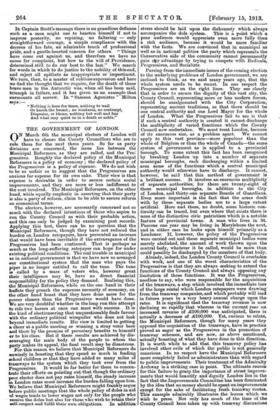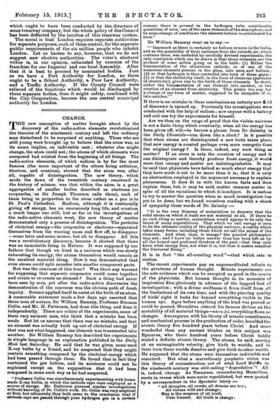THE GOVERNMENT OF LONDON.
ON March 6th the municipal electors of London will have to choose the County Councillors who are to rule them for the next three years. So far as party divisions are concerned, the issue lies between the Municipal Reformers, as they are called, and the Pro: gressives. Roughly the declared policy of the Municipal Reformers is a policy of economy ; the declared policy of the Progressives is a policy of expense. We do not wish to be so unfair as to suggest that the Progressives are anxious for expense for its own sake. Their view is that expense is desirable in order to secure certain social improvements, and they are more or less indifferent to the cost involved. The Municipal Reformers, on the other hand, while equally emphatic in asserting that their party is also a party of reform, claim to be able to secure reform on economical terms.
The electors, however, are necessarily concerned not so much with the declared intentions of those who aspire to run the County Council as with their probable action, and this can only be judged by examining past records. Applying this test, there can be no question that the Municipal Reformers, though they have not reduced the burden on London ratepayers, have prevented an increase that would have been inevitable if the extravagance of the Progressives had been continued. That is perhaps as much as the long-suffering ratepayer can hope for under existing political conditions. The real trouble in municipal as in national government is that we have now so arranged our constitutional system that the man who pays the piper is no longer entitled to call the tune. The tune is called by a mass of voters who, however great their intelligence may be, have no direct financial responsibility for the policy they demand. Realising this, the Municipal Reformers, while on the one hand in their leaflets they preach the supreme necessity of economy, on the other hand boast that they have done more for the poorer classes than the Progressives would have done. We are very doubtful whether in the long run this attempt to ride two horses at once can meet with success. It is the kind of electioneering that unquestionably finds favour with the ordinary political wirepuller who does not look beyond immediate results. His view is limited to getting a cheer at a public meeting or winning a, stray voter here and there by the promise of pecuniary benefits to himself or to his class. But if these results are achieved by dis- couraging the main body of the people to whom the party makes its appeal, the final result may be disastrous. For this reason we believe that Municipal Reformers do unwisely in boasting that they spend so much in feeding school children or that they have added so many miles of tramways to the system which they took over from the Progressives. It would be far better for them to concen- trate their efforts on pointing out that though the ordinary poor elector does not pay rates himself, the steady increase in London rates must increase the burden falling upon him. We believe that Municipal Reformers might frankly argue before public meetings that the whole policy of doles in aid of wages tends to lower wages not only for the people who receive the doles but also for those who wish to retain their self-respect and fulfil their own obligations. In addition stress should be kid upon the dishonesty which always accompanies the dole system. This is a point which a poor audience would appreciate even more fully than ari ch audience, because it would be more familiar with the facts. We are convinced that in municipal as well as in national politics the party which represents the Conservative side of the community cannot permanently gain atjy advantage by trying to compete with Radicals, Progressives, and Socialists.
Passing from the immediate issues of the coming election to the underlying problems of London government, we are inclined to think, as we said many years ago, that the whole system needs to be recast. In one respect the Progressives are on the right lines. They see clearly that in order to secure the dignity of this vast city, the County Council, representing more or less modern forces, should be amalgamated with the City Corporation, representing ancient traditions, so that there should be one central authority and one Lord Mayor for the whole of London. What the Progressives fail to see is that if such a central authority is created it cannot discharge the multiplicity of varied functions which the County Council now undertakes. We must treat London, because of its enormous size, as a problem apart. We cannot apply to this vast province—more populous than the whole of Belgium or than the whole of Canada—the same system of government as is applied to a provincial borough. To some extent this fact has been recognized by breaking London up into a number of separate municipal boroughs, each discharging within a limited area some of the functions which a central municipal authority would otherwise have to discharge. It cannot, however, be said that this method of government is a brilliant success. It involves an enormous multiplicity of separate authorities, for there are twenty-eight of these municipal boroughs, in addition to the City of London, and thirty-one separate Boards of Guardians. Even more important is the fact that the areas dealt with by these separate bodies are to a large extent artificial. Here and there, no doubt, some historic con- tinuity can be traced, but even where that exists there is none of the distinctive civic patriotism which is a notable feature of provincial towns. A man who lives in St. Pancras one year may be living in Marylebone the next, and in either case he looks upon himself primarily as a Londoner. If, however, the policy of the Progressives were carried out and these separate municipal bodies were merely abolished, the amount of work thrown upon the central body, whatever it be called, would be more than could possibly be discharged by the members of that body.
Already, indeed, the London County Council is overladen with work, and one of the worst characteristics of the Progressives is that they are always seeking to extend the functions of the County Council and always opposing any limitation of those functions. It was the Progressives, needless to say, who were responsible for the acquisition of the tramways, a step which involved the immediate loss of the large rental which London ratepayers were drawing from the tramway companies, and which probably will lead in future years to a very heavy annual charge upon the rates. It is significant that the tramway revenue is now declining so rapidly that whereas in the current year an increased revenue of £100,000 was anticipated, there is actually a decrease of £100,000. Yet, curious to relate, the Municipal Reformers, though for many years they opposed the acquisition of the tramways, have in practice proved as eager as the Progressives .in the promotion of tramway schemes, and are now, as above mentioned, actually boasting of what they have done in this direction. It is worth while to add that this tramway policy has involved other evils of which the public is not generally conscious. In no respect have the Municipal Reformers more completely failed as administrators than with regard to public improvements. Their treatment of the Admiralty Archway is a striking case in point. The ultimate reason for this failure to grasp the importance of street improve- ments that would beautify and dignify London lies in the fact that the Improvements Committee has been dominated by the idea that no money should be spent on improvements except for the sake of facilitating fresh tramway routes. This example admirably illustrates the lesson which we wish to press. Not only has much of the time of the County Council been taken up with tramway discussions which ought to have been conducted by the directors of some tramway company, but the whole policy of the Council has been deflected by the incubus of this tramway system. The moral is that London requires separate authorities for separate purposes, each of them central, for the separate public requirements of the six million people who inhabit London. Let us hasten to say, however, that we do not suggest new elective authorities. The voter's electoral virtue is, in our opinion, exhausted by exercise of the franchise for one Imperial and one local Assembly. After that it is best to proceed by nominated bodies. Just as we have a Port Authority for London, so there ought to be a School Authority, a Poor Law Authority, and a Traffic Authority. If the County Council were relieved of the functions which would be discharged by these separate bodies, then it might safely, combined with the City Corporation, become the one central municipal authority for London.











































 Previous page
Previous page